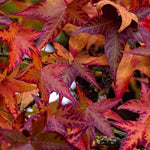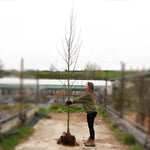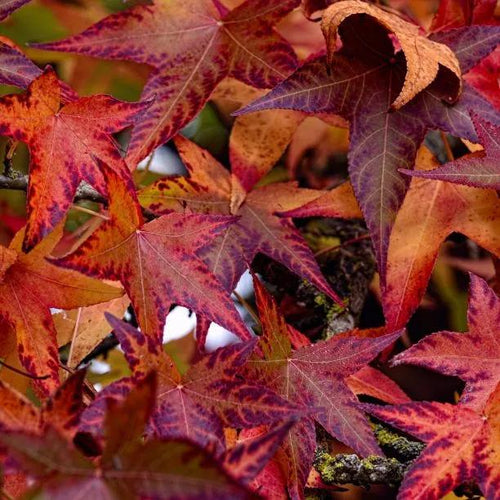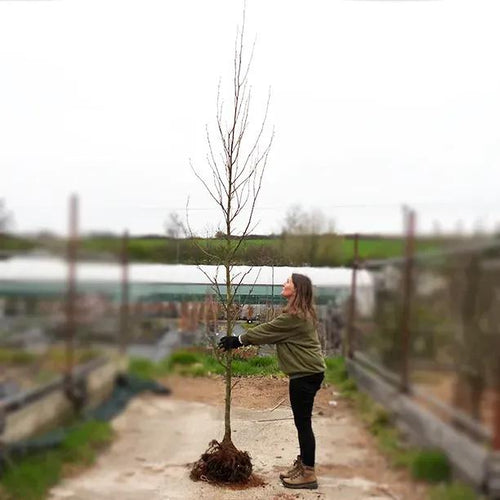 Delivered across the UK
Delivered across the UK Which Best Plant Supplier 2025
Which Best Plant Supplier 2025 1 Year Bareroot Plant Guarantee
1 Year Bareroot Plant Guarantee
About Worplesdon Sweet Gum Trees
Worplesdon Sweet Gum Trees
Worplesdon is an ornamental Liquidambar grown for its wonderfully coloured autumn foliage.
The star shaped leaves are lush, glossy green in summer and, starting in September, one of autumn's highlights, looking gorgeous for almost three months as a stunning range of glowing reds and oranges with a few purple touches engulfs the tree, and it's known as the Red Gum tree for this display.
The fallen leaves keep the gum's sweet aroma; a bundle of them in the garden shed will smell good for several weeks.
The rich brown young bark is unusually textured with corky scales and becomes ridged as it ages.
The flowers in April-May are distinctive, but hard to see among the leaves, being yellow-green piles of male buds from which dangle whitish-green female flowers. The female part matures into a spiky fruit husk, which are used in pot-pourri, and decorate the tree well into winter, providing some interest for birds. To deter dogs and cats from your flower beds, try covering them with these prickly seed cases (sweet chestnut husks are better).
It's not especially vigorous, about 6 metres high in 10 years is normal; mature trees can reach about 20 metres in the British climate.
Browse our large garden trees, or all of our trees.
Delivery season: Liquidambar trees are delivered bareroot during late autumn and winter, approximately November-March inclusive.
Features
- Height: To 20m
- Soil: Sunny, moist, acidic
- Superb and long lasting Autumn colour
- Hardy, but thrives best in warmer Southern regions
- RHS Award of Garden Merit
- Bareroot delivery only: November-March
Growing Liquidambar
It really loves sunny, moist, acidic sites in the South of Great Britain, where it'll look its best, but it's hardy, rated H6 by the RHS, and will be fine anywhere in Scotland with shelter from wind, fertile soil, and no frost pocket. The leaves are the main show, so if they're battered, stressed and undersized, the value of the tree is reduced.
In the South, they're good in dappled shade inside a woodland scheme. In the North, they'll be better at the front of the woods.
It's not that they won't grow on chalky soil: they will, and their Autumn colour will be dull rusty-brown, not fiery-red.
Note: Liquidambars don't like having their roots disturbed, and benefit from a longer period of planting aftercare than necessary for most other trees. It's usually best to stake them for two years to prevent wind rock, and vital to water attentively in dry weather into their third summer: by the fourth year, their roots will be solid and increasingly drought resistant, but if there is a drought that year, water them.
History & Trivia
Worplesdon is, of course, a dinosaur, like Stegodon, but since then it is also a town in Surrey, where this cultivar was noted by a local in 1968 and brought to the attention of George Jackman and Son Nursery in Woking, of clematis fame.
Sweet Gum refers to the pleasant smelling resin, called styrax, that the tree emits when damaged. Its heartwood is called satin walnut, which polishes beautifully and makes great furniture.
The species is known as the alligator tree for its bark, which is similar to a native Field Maple, Acer campestre.
Standard trees are measured by their girth in centimetres 1 metre above ground level: their trunk's waist measurement. Unlike sapling trees and hedge plants, standards aren't measured by their height, which will vary quite a bit both between and within species.
So, a 6/8cm standard tree has a trunk with a circumference of 6-8cm and an 8/10 standard has a trunk 8-10cm around. This measurement makes no difference to the tree's final height.
On average, standard trees are 2-3.5 metres tall when they arrive, but we cannot tell you precisely how tall your trees will be before we deliver them.












 Secure, One-Tap Checkout
Secure, One-Tap Checkout
 Hand Picked, Delivered to Your Door!
Hand Picked, Delivered to Your Door! 1 Year Bareroot Guarantee
1 Year Bareroot Guarantee











